
Defining a Value Hypothesis
Grasping the Essence of a Value Hypothesis
In the realm of software development, understanding the concept of a value hypothesis is crucial for any startup or established business aiming to innovate effectively. A value hypothesis is essentially an assumption about what value a product or service will deliver to its target audience. It is a foundational element that helps businesses determine whether their product will meet the needs of their customers and solve a specific problem in the market.
At its core, a value hypothesis is about predicting the product value that will resonate with customers. It involves making educated guesses about how a product will perform in the market and what kind of customer feedback it will generate. This hypothesis is not just about the product itself but also about the entire product service experience, including how it will be perceived by the target audience.
For businesses, especially startups, formulating a value hypothesis is a critical step in the product development process. It opens a window to understanding customer needs and aligning the product market strategy accordingly. By focusing on the value proposition, companies can better position themselves for growth and success.
However, crafting a value hypothesis is not without its challenges. It requires a deep understanding of the market, customer behavior, and the competitive landscape. Businesses must rely on data and customer feedback to refine their assumptions and ensure that their hypothesis aligns with real-world needs.
For those interested in diving deeper into how to effectively test and validate these hypotheses, exploring essential questions for effective beta testing in software development can provide valuable insights. This process is integral to ensuring that the minimum viable product truly meets the expectations set by the value hypothesis.
The Role of Value Hypotheses in Innovation
The Catalyst for Innovation
In the realm of software development, the concept of a value hypothesis is pivotal in driving innovation. It serves as a foundational element that guides startups and established businesses alike in identifying what value their product or service brings to the market. By formulating a clear value hypothesis, companies can better understand their target audience and the specific problem they aim to solve.
Value hypotheses are not just abstract ideas; they are practical tools that open windows to new opportunities. They help businesses align their product development efforts with customer needs and expectations. This alignment is crucial for ensuring that the product or service resonates with the intended customers, ultimately leading to increased sales and growth.
Guiding Product Development
Incorporating value hypotheses into the product development process allows companies to make informed decisions based on data and customer feedback. This approach is particularly beneficial for startups operating under the lean startup methodology, where resources are limited, and the need for rapid iteration is critical. By testing and refining their value hypotheses, businesses can minimize risks and enhance their product value.
Moreover, value hypotheses play a significant role in shaping the minimum viable product (MVP). By focusing on the core features that deliver the most value to the target audience, companies can efficiently allocate their resources and accelerate their time to market. This strategic focus not only boosts business success but also fosters a culture of continuous improvement and innovation.
For more insights on how value hypotheses can be leveraged to explore constructive solution options in software development, you can read our detailed article on exploring constructive solution options in software development.
Testing and Validating Value Hypotheses
Evaluating Assumptions Through Rigorous Testing
Testing and validating a value hypothesis is a crucial step in the software development process. It involves assessing whether the assumptions about the product, market, and customer needs are accurate. This process is essential for startups and established businesses alike, as it opens a window to understanding the real value proposition of a product or service.
In the lean startup methodology, the focus is on creating a minimum viable product (MVP) to test the hypothesis value quickly and efficiently. This approach allows businesses to gather customer feedback early in the product development cycle, minimizing the risk of investing time and resources into a product that does not meet the target audience's needs.
Leveraging Data for Informed Decisions
Data plays a pivotal role in validating value hypotheses. By analyzing customer feedback and usage patterns, businesses can determine if their product or service solves a real problem for their customers. This data-driven approach helps in refining the product market fit and ensuring that the product value aligns with customer expectations.
Moreover, testing should not be a one-time event. Continuous evaluation and iteration based on customer feedback and market trends are necessary for sustained growth. This iterative process helps in adapting to changing market dynamics and customer preferences, ultimately leading to business success.
Challenges and Considerations
Despite its importance, testing a value hypothesis comes with its own set of challenges. One of the primary hurdles is the time and resources required to gather meaningful data. Additionally, businesses must be prepared to pivot their strategy if the initial hypothesis does not hold true. This flexibility is crucial for adapting to new insights and maintaining a competitive edge in the market.
For those interested in exploring the benefits and challenges of outsourcing SaaS development, a deeper understanding can be gained from this resource.
Challenges in Formulating Value Hypotheses
Overcoming the Hurdles in Crafting Value Hypotheses
Formulating a robust value hypothesis is no small feat. It requires a deep understanding of the target audience and the market dynamics. One of the primary challenges lies in accurately identifying customer needs and aligning them with the product value. This involves sifting through customer feedback and data to discern what truly matters to the customers.
Another significant challenge is dealing with the inherent assumptions that come with any startup idea. These assumptions can cloud judgment and lead to misguided product development. To mitigate this, businesses must engage in rigorous testing and validation processes, ensuring that the value proposition resonates with the intended target audience.
Time constraints also pose a challenge. In the fast-paced world of lean startups, there is often pressure to deliver a minimum viable product quickly. This can lead to shortcuts in the hypothesis formulation process, potentially compromising the product market fit.
Moreover, the dynamic nature of markets means that what is valuable today might not be tomorrow. Businesses must remain agile, continuously revisiting and refining their value hypotheses to keep pace with evolving customer expectations and market trends.
Ultimately, overcoming these challenges requires a strategic approach to product management, where growth is driven by a clear understanding of customer problems and a commitment to delivering solutions that provide genuine value.
Impact on User Satisfaction and Business Success
Enhancing User Satisfaction Through Value Hypotheses
In the realm of software development, understanding what value a product brings to its target audience is crucial. A well-formulated value hypothesis serves as a guiding light for ensuring that the product meets the needs and expectations of customers. By focusing on the problem that the product aims to solve, developers can tailor their efforts to create a viable product that resonates with users.
Driving Business Success with Strategic Hypotheses
For businesses, especially startups, the ability to align their value proposition with customer needs is paramount. A clear value hypothesis not only informs product development but also shapes business strategies. By continuously gathering customer feedback and refining their assumptions, companies can enhance their product market fit, ultimately boosting sales and fostering growth.
Feedback Loops and Continuous Improvement
Incorporating customer feedback into the development process opens a window to continuous improvement. By testing and validating value hypotheses, businesses can make data-driven decisions that enhance product value. This iterative process is akin to the lean startup methodology, where minimum viable products are launched to gather insights and refine the product service offering over time.
Challenges and Opportunities in a Competitive Market
While formulating and testing value hypotheses presents challenges, such as accurately predicting customer needs and market trends, it also offers opportunities for differentiation. Companies that effectively leverage their hypothesis value can position themselves as leaders in their field, capturing a larger click share and establishing a strong foothold in the market.
Future Trends in Value Hypotheses for Software
Emerging Trends in Value Hypotheses
As the software landscape evolves, the formulation and application of value hypotheses are expected to undergo significant transformations. These changes will be driven by advancements in technology, shifts in customer expectations, and the continuous pursuit of innovation within the industry.
Data-Driven Decision Making
The future of value hypotheses will increasingly rely on data-driven insights. With the proliferation of big data and advanced analytics, businesses will be better equipped to validate their assumptions and refine their product value propositions. This shift will enable more precise targeting of the market and customer segments, ultimately enhancing the effectiveness of product development strategies.
Integration with Lean Startup Methodologies
Lean startup principles will continue to play a crucial role in shaping how value hypotheses are tested and validated. By focusing on minimum viable products and rapid iterations, companies can gather customer feedback more efficiently, reducing the time and resources spent on unviable product ideas. This approach opens a window to more agile and responsive product management practices.
Enhanced Customer Feedback Mechanisms
In the coming years, the mechanisms for collecting and analyzing customer feedback will become more sophisticated. Businesses will leverage advanced tools to gather real-time insights into customer needs and preferences, allowing for more accurate hypothesis testing. This evolution will facilitate a deeper understanding of what value customers seek, driving both product and business growth.
Focus on Personalized Customer Experiences
As customer expectations continue to rise, the emphasis on personalized experiences will become more pronounced. Value hypotheses will need to account for the diverse needs of the target audience, ensuring that products and services are tailored to individual preferences. This trend will require a more nuanced approach to understanding the problem space and crafting solutions that resonate with customers.
Collaboration and Cross-Disciplinary Innovation
The future will see greater collaboration across disciplines, as businesses seek to integrate diverse perspectives into their value hypotheses. By fostering cross-disciplinary innovation, companies can develop more comprehensive solutions that address complex market challenges. This collaborative approach will be essential for maintaining a competitive edge in an increasingly dynamic software market.













